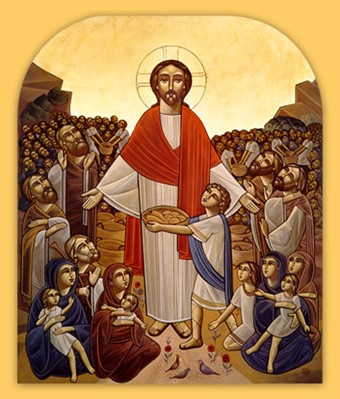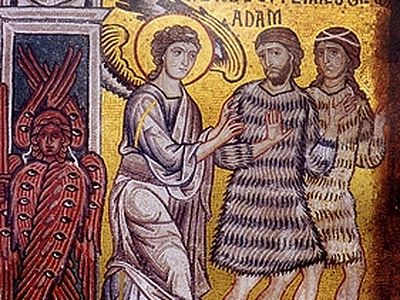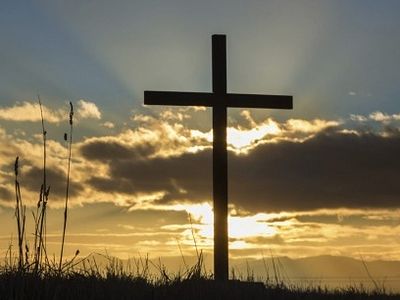Sunday, July 26, 2015: The Holy Righteous Martyr Paraskeva of Rome & Eighth Sunday of Matthew
Hieromartyrs Hermolaus, Hermippus, and Hermocrates of Nicomedia; Venerable Gerontios, first settler of St. Anne skete on Athos; Moses the Hungarian; Sabbas III, archbishop of Serbia; Priest Jacob Netsvetov, enlightener of the peoples of Alaska
EPISTLE: Galatians 3:23-4:5
GOSPEL: Matthew 14:14-22

This is the point the Apostle Paul is making in his epistle. Human history is the record of human achievement and failure. Much less is it a random series of events. No, at is core human history is the record of God’s overtures to the human heart. Yes there are many instances of failure—my own chief among them—but more importantly still, it the record of God’s offer of forgiveness again and again the face of my sinfulness. Like Adam, I hide from God; like Abraham, I doubt God’s promise; like Moses, my obedience is imperfect; like Israel my fidelity is often found lacking especially in moments of crisis.
And yet for all this, God remains faithful.
Try as I might to limit His fidelity—to deny that He extends forgiveness to this person or that—He remains faithful to the Jew as well as the Greek, to women and to men, to the powerless as much as the powerful. God doesn’t forgive me, He forgive us all, working even on the Sabbath to free us from our self-imposed slavery to sin and death. And of course, He remains faithful to me, calling me, wooing and inviting me to become more fully myself by becoming more fully like His Son.
But, like I said, I look at the work that God asks me to do and I say I can’t, I don’t have the material resources, the personal ability or the social status needed; I always have my reasons for saying no. This happens because I’m all too prone to forget what He has done not just for me but for you, and you and every person who has—or will—walk the earth.
This forgetfulness afflicts the disciples in this morning’s Gospel. They have already forgotten the miracles that they’ve seen. They will even forget that Jesus feed the 5,000 when, in just a little while, Jesus again tells them to feed the 4,000 (see Matthew 15:32-16:10).
Most all though this, this forgetfulness is my affliction.
This why I need the rhythm of feasts and fast that make up the liturgical cycle of the Church. Essential those these are, I also need to habit of daily prayer and the reading of Scripture. Without both the communal and the personal, my spiritual life is unbalanced. On the one hand, without the guidance and structure of the liturgy, personal prayer and study of Scripture becomes eccentric as they more and more come to be dominated by my own otherwise legitimate concerns. On the other hand, without personal prayer and reflection on the Scriptures, liturgy becomes, at best, merely a performance. A religious motivated and theologically sound performance to be sure but still one that remains external to my heart.
Finding this balance, this rhythm between the personal and communal is always a challenge because we are always changing. We are none of us quite the same person we were yesterday, even as we will be a little different tomorrow.
This is not, as the saying goes, a bug in the system but a feature. Change is inherent I being a creature. St Gregory of Nyssa says that it is only through constant, often almost imperceptible, change that we can become like the God Who never changes. For us as creatures, the saints says, perfection is this: To change and change frequently.
This isn’t change for its own sake but rather reflects our vocation to become more and more like Christ. If I forget that this process is guided by the grace of God and that I am striving to acquire the Holy Spirit to become more like Christ, the constant changes that are part of life will overwhelm me. Rather than being a graced invitation to become more like Christ, I will see change—even good changes—as a threat, as just one more thing that unsettles my life.
And I will see the requests that God makes of me not as an opportunity to grow in love but something else altogether different. A revelation not of who I can become but of my failure, my inadequacies, my worthlessness. Forgetful of God and His love, the Christian life becomes a series of pointless trials and the Gospel merely one more oppressive ideology not better, and in some ways much worse, than any other.
My brothers and sisters in Christ, both the Epistle and the Gospel remind us that God stands with us to support and sustain us in all that He asks us to do. We need to be mindful of His Presence. We also need to resolve with the help of His grace to change and change frequently in obedience to His call for our lives. Such changes are not an abandonment in what is essential—of the “faith which has been believed everywhere, always, by all. (Commonitory ch. II, §6; NPNF Series II Vol. XI p. 132). It is rather a matter of first laying aside my own sinfulness and sinfulness dispositions. Then, building on this, I must also lay aside “earthly things” in pursuit of “heavenly gifts; for temporal, eternal; for corruptible, incorruptible” according to the measure of God’s grace for my life.
In Christ,
+Fr Gregory



